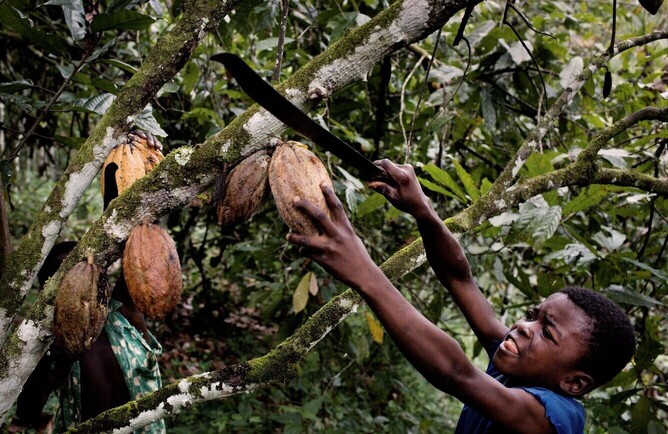Nestle is an attractive company to invest in from the financial and traditional profitability perspective and as a consequence, is in many of our clients portfolios. However, there is an ethical issue, in the form of child labour.
A study by the University of Chicago estimates that 45% of children living in agricultural areas on cocoa growing areas were engaged in child labour and 43% were engaged in hazardous child labour in cocoa production in aggregate. Particular areas of concern are in Ghana and Cote d’Ivorie. However, the ethics of the situation are tricky, as, without the income from the children working many families would not be able to survive.
This impacts on the seven big western companies involved in the chocolate trade – (Nestle, Hershey, Cargill, Mars, Mondelez, Barry Callebaut and Olam) who were sued just over a year ago by an campaign group called International Rights Advocates, for their use of child labour in their supply chains (Focussing on trafficking of children to work in the farms). The US Supreme Court found there was no basis for the legal action. (Financial Times - Moral Money, Nestle).
For a number of years now, NGO’s and investors have been discussing the issue of child labour with Nestle. Magellan, one of your fund managers has had extensive discourse to understand where Nestle are going with dealing with the issue. Until now, not much has happened apart from a commitment that Nestle would try and do something about it, but that child slavery was a problem that lay beyond it’s control.
However, Nestle have taken a step and announced plans to triple its cocoa sustainability funding to $1.4bn over eight years, and, most crucially, to start making direct payouts to African cocoa farmers in a bid to remove child labour from its supply chain. These moves include paying farming households for sending their children to school, implementing good agricultural practices, which could increase yields up to threefold. This will lead to increases in the price of some of it’s chocolate, but Nestle will also work on making its own operations more efficient.
Because the suppliers are small, cocoa is often sourced through bulk suppliers, which provides a murky supply chain where child labour and other modern slavery can be hidden. Nestle has also committed to source all of its cocoa directly by 2025 (as compared to 51% now).
Read Nestle's comments here.
Financial Times comments:
The idea is that households involved in cocoa cultivation and harvesting will “receive payments for sending their children to school, implementing good agricultural practices like pruning, and sustainable measures such as planting shade trees”. Those diversifying their incomes through other means, including additional crops and livestock, will also be paid. The Nestlé managers hope this incentive-based approach will raise standards more effectively than simply saying they want to abolish the problem.
The initiative has had a cautious welcome from some NGOs. Antonie Fountain, managing director of the Voice Network, an umbrella group for 17 non-profit organisations, told the FT the tactic “could be successful” and “maybe every company will need to do this in the future”.
So we will be watching to see whether the other six cocoa groups follow suit, particularly since entities such as Mars have been stepping up their own ESG initiatives. (The privately held group recently took the novel step of giving ESG responsibilities to the head of procurement.)
There are at least three key points that the wider — non-chocolate — business world should note.
The first is that NGOs are getting savvier in terms of how they are tracking and targeting asset owners in relation to ESG issues in their supply chains. Second, activists are doing this not just in relation to “E” factors, but “S” topics too; the type of lateral vision associated with “scope 3” accounting systems for carbon emissions is being transposed on to social issues.
Third, insofar as companies are being forced to take a lateral — not tunnel — view of their operations, this is prompting some to get more imaginative with their supply chains. The onus is now on companies to take direct action to fix embarrassing issues — rather than simply hoping that NGOs or governments can fix them. One sign of this shifting mentality can be seen in Walmart’s recent announcement that it will provide direct finance to its suppliers to help them decarbonise, since it cannot assume that multilateral banks or private banks will provide the funds.
Nestlé’s move is in a similar vein, since it now recognises that it cannot rely on governments or NGOs alone to stop child labour. Moral Money suspects that this trend will keep spreading.
Through Moneyworks unique and proprietary ethical analysis process, we can identify the main holdings in your personal investment portfolio and KiwiSaver, reporting on that for you. This enables us to track events that will have a negative or positive impact on your investments from an ethical perspective. Your fund managers are also monitoring the companies from a financial perspective, and a number of managers from an ethical perspective as well.


